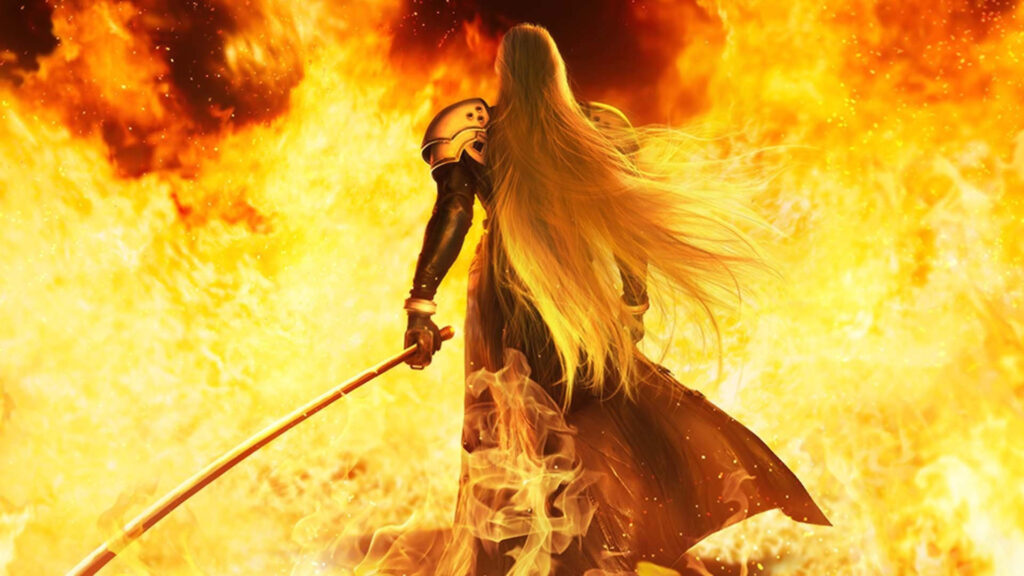
Final Fantasy VII was a watershed moment in video games. It not only put the franchise on the map, but it also got all eyes on the JRPG genre as a whole. You saw an enormous surge in popularity in similar kind of games, with stories that merged fantasy with science fiction, and a touch of horror.
Final Fantasy VII changed the the landscape of games forever, and today we still feel its ripples with how it influenced countless designers and developers. It was a story that had a little bit of everything, and somehow was cohesive thanks to its taut pacing. One day, the venerable Japanese game developer released a PS3 tech demo of the intro remade with realistic graphics.
From that moment on, Square Enix created a monster that would loom over them for decades. For over 20 long years, fans have begged for a remake of the 1997 masterpiece. What could be the most ambitious project in the industry, Square Enix has finally remade their most important game… or have all of us been deceived?
Final Fantasy VII: Remake
Developer: Square Enix
Publisher: Square Enix
Platforms: PlayStation 4
Release Date: April 10, 2020
Players: 1
Price: $59.99
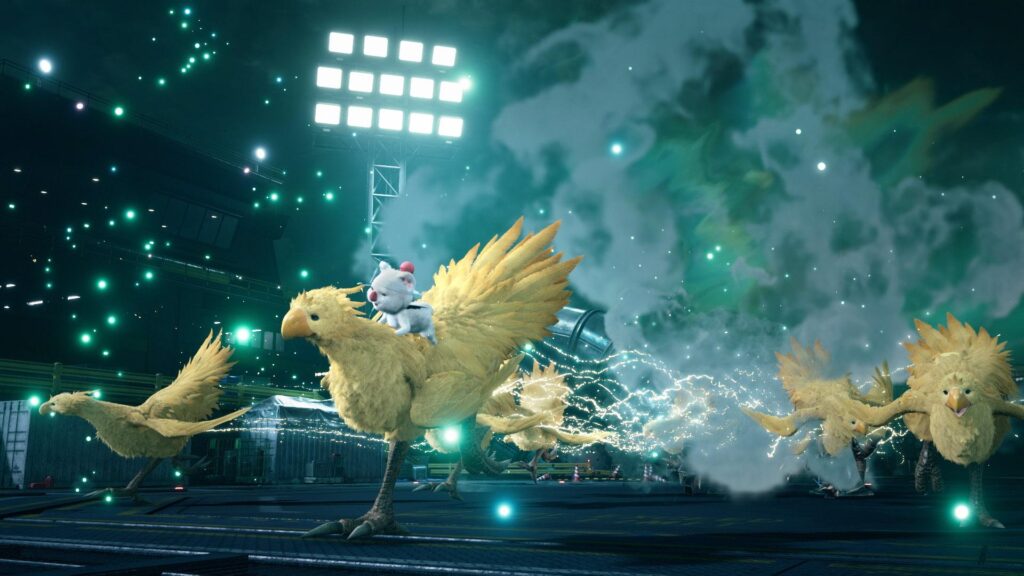
Remaking Final Fantasy VII, should have been simple. Ever since the sixth console generation, Square Enix has tried to cut corners around how they make RPGs compared to how they used to make them on the original PlayStation. You might have noticed how recent entries in the venerable franchise scale back on how the game worlds are constructed.
In a Final Fantasy, you could always expect a vast world to explore with various locations to visit and every thing was connected in a very natural way. As time went on there were smaller worlds, and locations were a collection of sky boxes with hallways connecting them together.
It is unknown why Square Enix’s team has been utterly incapable of crafting worlds like they used to. Other franchises they own like Dragon Quest managed it on the PlayStation 2. Even Dragon Quest XI was able to pull off a sizable world with lots of detail on a Nintendo Switch.
This has been an issue for the developers of Final Fantasy VII Remake, and their “solution” is to cut the game up into episodes.
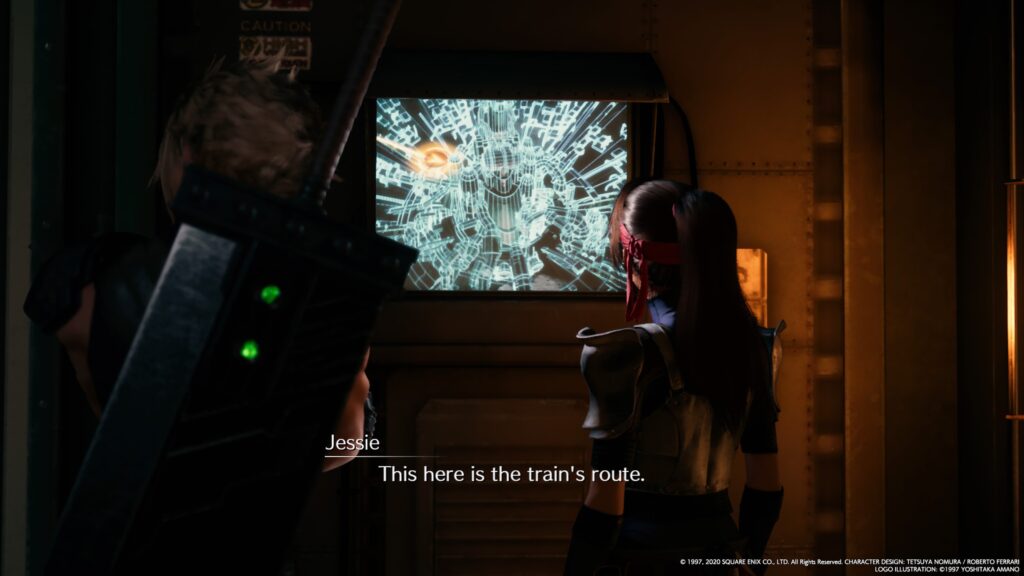
Final Fantasy VII (1997) was an epic JRPG that spanned multiple discs, but it was not the longest RPG on PlayStation. If you played it, the “Midgar arc” was the intro of the game’s setting. Most gamers would take between four to five hours to see everything there was to experience in that section alone.
It was a very trim and exciting introduction that establishes many concepts that come into play as the adventure unfolds at a brisk clip, rarely wasting time. By the time you had to leave the city of Midgar the stakes were defined, and you had a world to explore. Between leaving Midgar and the end of the first disc, you would recruit four more characters and explored half of the world.
Final Fantasy VII Remake exclusively focuses on only the “Midgar arc,” and stretches it out to be about as long as the original Final Fantasy VII. While this experiment does come with some benefits, it also comes at the expense of pacing.
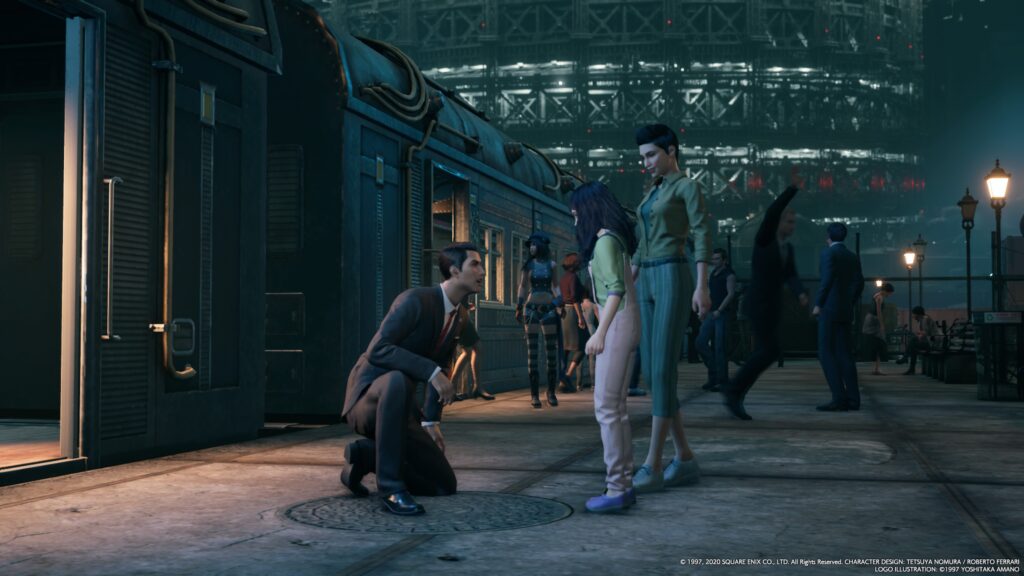
Final Fantasy VII Remake agonizes over details. A lot of it is unnecessary, and slows things down to a halt. Things like Sector 7 slums having a watch crew, and them needing Cloud to take care of a bunch of unimaginative side jobs that amount to “go there and kill a thing” is not substantial. The production quality during these moments also take a nose dive in what is normally a gorgeous game.
The Wall Market sequence used to be a funny but necessary chain of events that you could do at your leisure. A sizable chunk of it has been re-imagined as a tedious side quest involving the bumbling Johnny, and it has nothing to do with getting dressed up anymore.
You really feel the length of how moments from the original have been padded out. In a vacuum this could be fascinating; but the fact remains that the game exists because of the original, and it’s much more inefficient at telling its story.
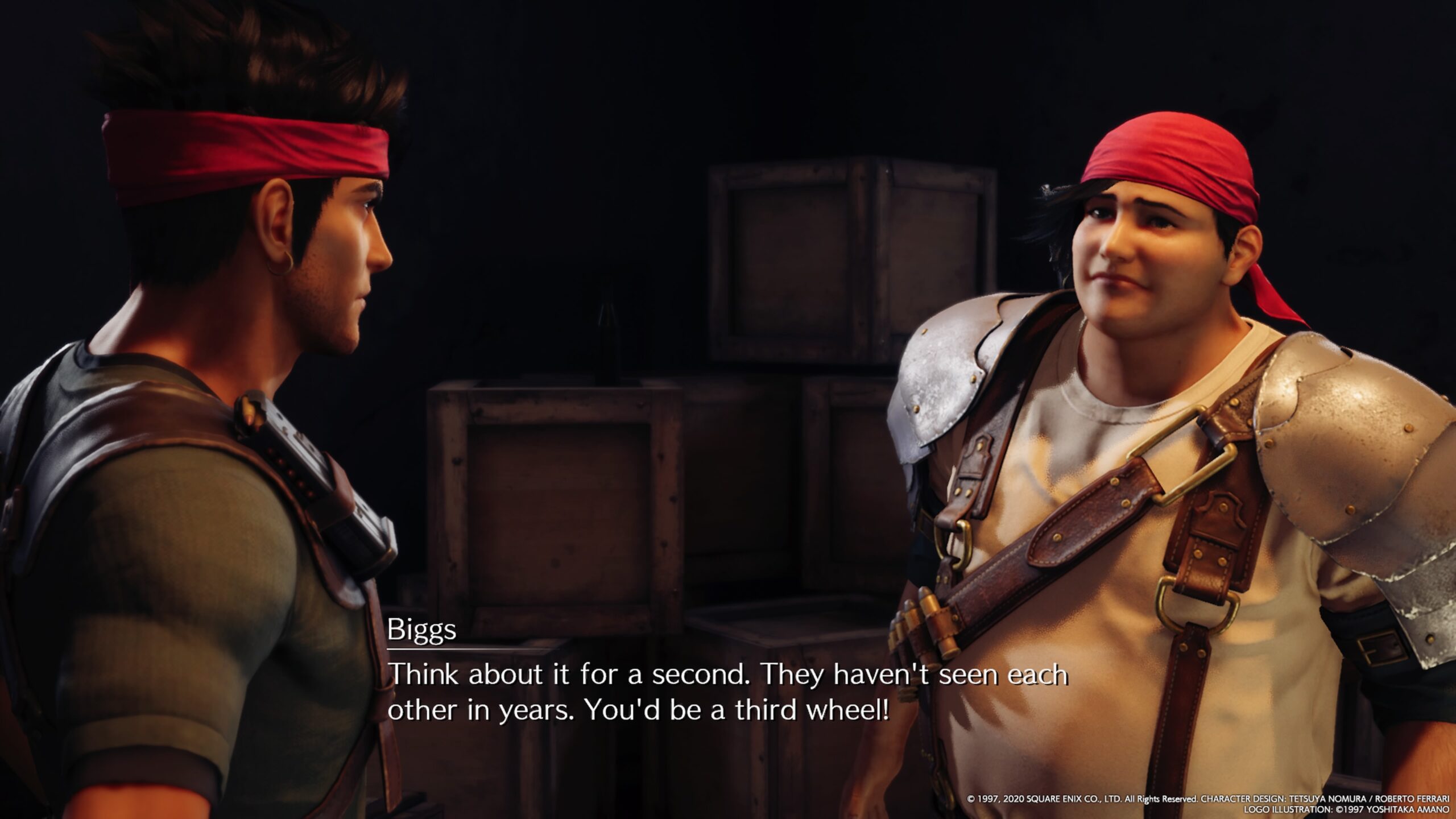
A major reason why Midgar felt so magical was because of how brief it was, and how you had to use your imagination to fill the gaps. The remake goes too far in places; like how Biggs, Wedge, and Jessie get an entire chapter dedicated to ripping off a warehouse. It ultimately contributes nothing to the story, and proves to be inconsequential.
The extra development given to these characters is excellent, and their actors give incredible performances to bring them to life. The extra scenarios just have no purpose, outside of arbitrarily lengthening the time in Midgar so Square Enix can put off having to make worlds again.
Final Fantasy VII Remake does honor a lot of the original’s story in the most broadest of terms. The main three acts of the “Midgar arc” are all present, and the themes of class and environmentalism are further expanded upon, even if they are done in a very ham-fisted way.
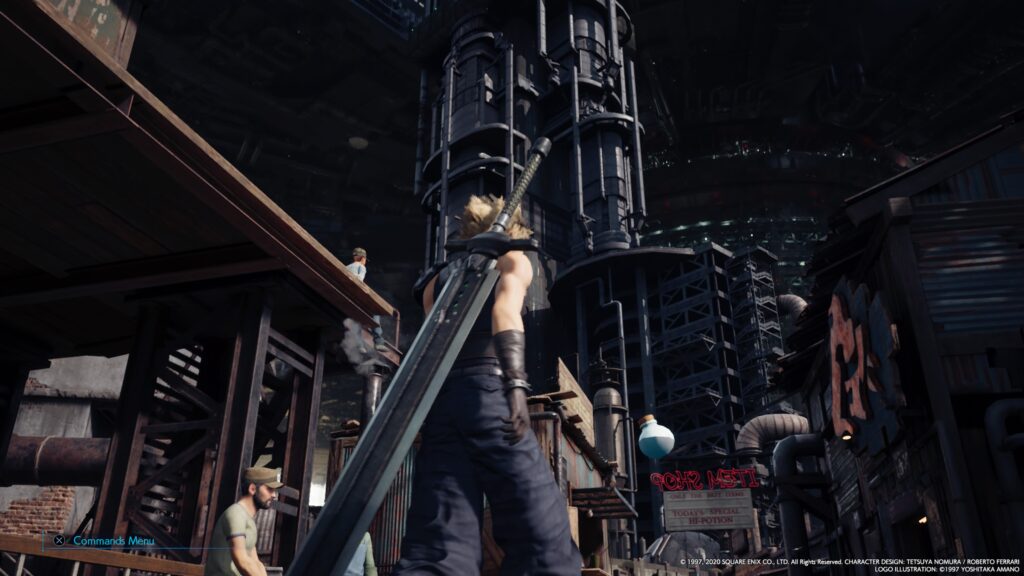
Barret is still the militant eco-terrorist that he always was. He is perfectly realized as you remembered him from the original game, and his voice actor flawlessly nails the Mr. T-esque persona we all assumed he had. You’d think it might get old, but Barret is consistently a joy to watch and listen to. His boisterous mannerisms and body language always keep him entertaining.
Tifa Lockhart was mostly translated well. Her voice does seem a bit deeper and older than her frame might suggest, but her actress does give a strong performance. She comes off as demure and sweet, totally contrasting her martial arts expertise. It’s too bad that like Jill Valentine, Tifa has lost her tight action mini skirt and wears ugly shorts under a floppy skirt now.
Tifa was an enabler, and it would sometimes make her look weak or idiotic when she would fall for Cloud. She was always trying to force things to “just work”, hoping to “fix” him. Her most crucial growth is sadly not going to be covered in Final Fantasy VII Remake, and she is a flatter character as a result.
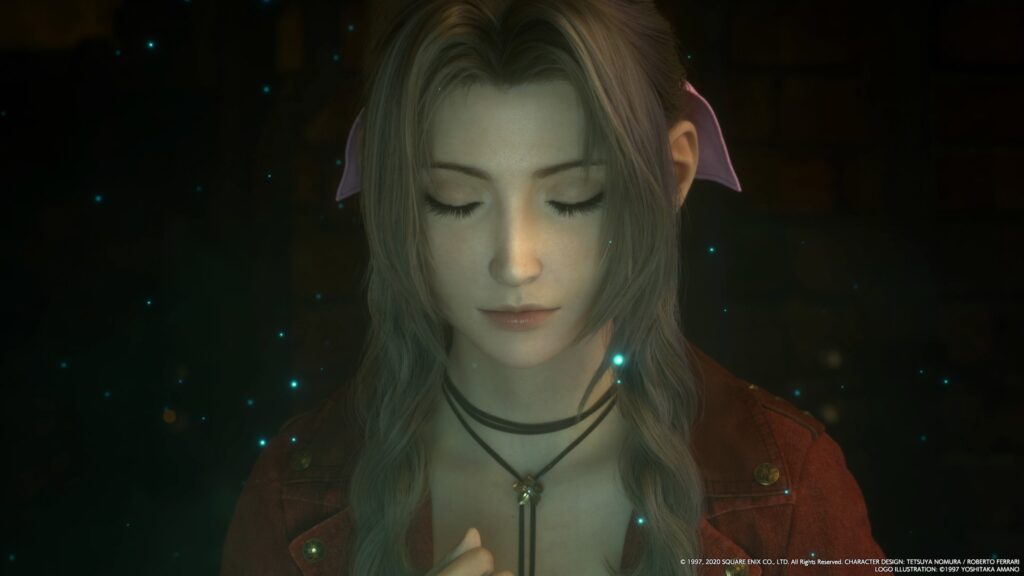
Aerith has benefited the most from the main cast in terms of characterization for the remake. She comes off as much more street-wise than she ever has, and her exchanges and interactions with Cloud helps reinforce their relationship.
For all its additions, Final Fantasy VII Remake makes cuts to the story as well. There was one scene in the original where the cast was locked in prison cells, and there were meaningful exchanges. Sadly, this scene is gone in the remake. As long as Cloud wears a dress, then fans won’t riot, right?
Things become further distracting when a Red XIII does not become a playable character. This talkative crimson coyote was a memorable party member who was fully usable in 1997, but the constraints of the remake’s episodic structure has limited him, since he is acquired so late in the game. It begs the question why bother having him at all?
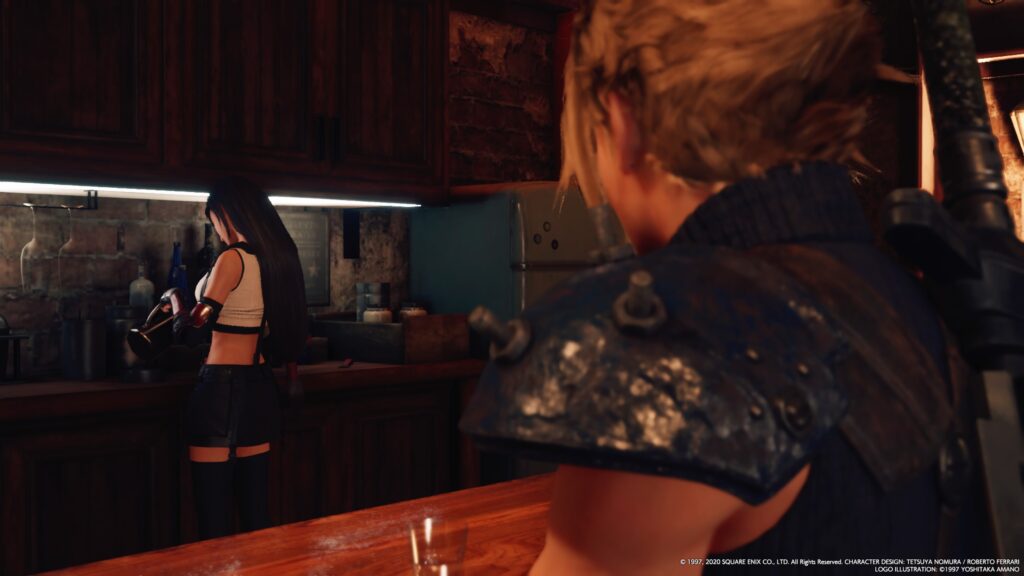
Since Final Fantasy VII Remake only covers the earliest moments of a much grander story, some characters are shafted on character development. Cloud especially has to be stuck in his moodiness for so long, because he can’t have his growth until certain events happen. As a result, Cloud is an unimaginable jerk for over 30 hours.
The limitations of the episodic structure derail so much of what made Cloud’s odyssey of self discovery. It was a major aspect of the story, and anyone who connected to it won’t find it in Final Fantasy VII Remake. There are attempts to gradually show his change, but it is never complete, and he comes off much less likable than his low-poly counterpart.
The attempts to flesh out Biggs, Wedge, and Jessie are successful when the game is following the original plot. The performers deliver their lines very naturally, and everyone comes off as very real. Wedge being really into cats, Jessie’s failed acting career, and Biggs’ history running an orphanage are wonderful flourishes to characters that were very simple in the 1997 game.
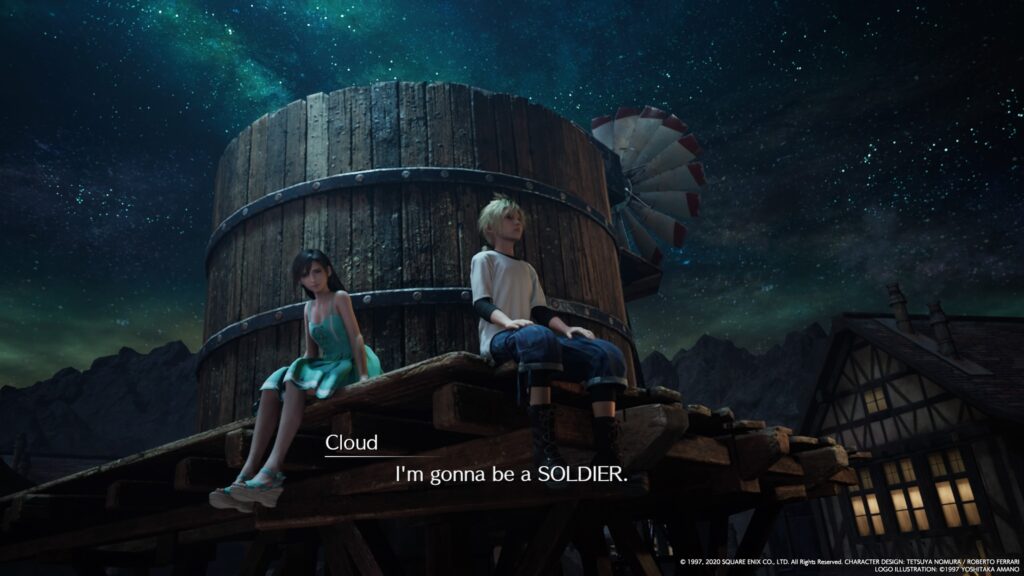
Final Fantasy VII Remake had to fill out the padded out plot with an extended supporting cast to keep things interesting. Wall Market can’t just be run by Don Corneo, he has to have three high ranking underlings who help him carry out his human-trafficking ring. None of these characters contribute anything in the grand scheme of the narrative.
There are so many existing characters in Final Fantasy VII Remake that are from the original that are more important and have purpose. Square Enix really wanted to put Yuffie in the game. Instead, make way for her cheap knock-off Kyrie Kanaan who could be easily mistaken for Yuffie incognito. This sloppy writing cheapens the character and can be seen through out in the form of other characters.
There are so many further complications that feel so forced and arbitrarily put into place, because Square Enix has to fill this scenario with things to do. The situation gets really stupid towards the end, when the plot gets extremely convoluted. Square Enix couldn’t just let Final Fantasy VII Remake be a remake of a straight forward story.
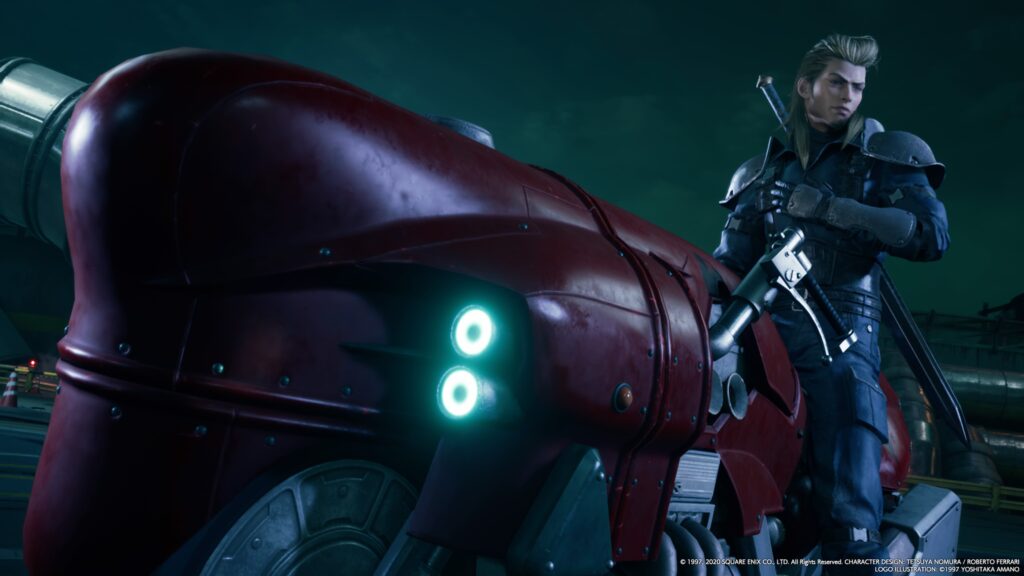
Without spoiling anything, it must be mentioned there have been some substantial changes to the narrative and its plot towards the latter portions of the game. None of the changes are for the better, and they fly in the face of what every fan has been wanting.
Sephiroth was the main antagonist in Final Fantasy VII (1997), and the story built up to him. It was a slow and gradual reveal that made him such an enigmatic and kind of scary guy. Much of the horror elements the surround him and the later portions of the Midgar arc are dropped.
The plot shows no restraint, and blows it’s load so early to eagerly show off Sephiroth. Even the “One Winged Angel” motif is overused and abused because of pop-culture demands that it always must be used. That song was used just for the final battle with Sephiroth in the original, and that one time is a part of why it was so awesome.
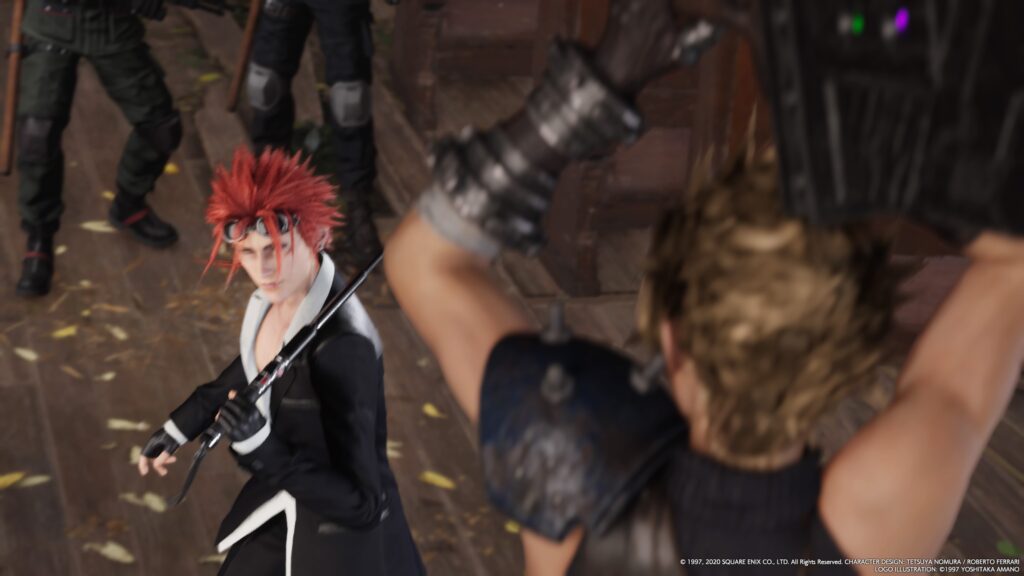
During the late game moments, Final Fantasy VII Remake gives up on all pretenses of it being a remake. The term “remake” itself turns out to be a coy play on words. It becomes questionable of who the game is meant for. Newcomers are not getting the enhanced and modernized remake of the classic JRPG.
What you are getting is a meta commentary on the concept of remakes, while ignoring the crucial elements of what made the original so beloved. The original Final Fantasy VII was not perfect, but it had a good story and with modern day resources and direction it could have been translated into a great story.
Unfortunately, Tetsuya Nomura is more interested in telling a worse story with worse pacing, and he is going to do it over the course of who knows how many episodes that may or may not ever be complete.
There was more to Final Fantasy VII than just Midgar. The world was so rich and full of sights to see and things to do. Being in a filthy junkyard and industrial wasteland wears thin pretty quickly.
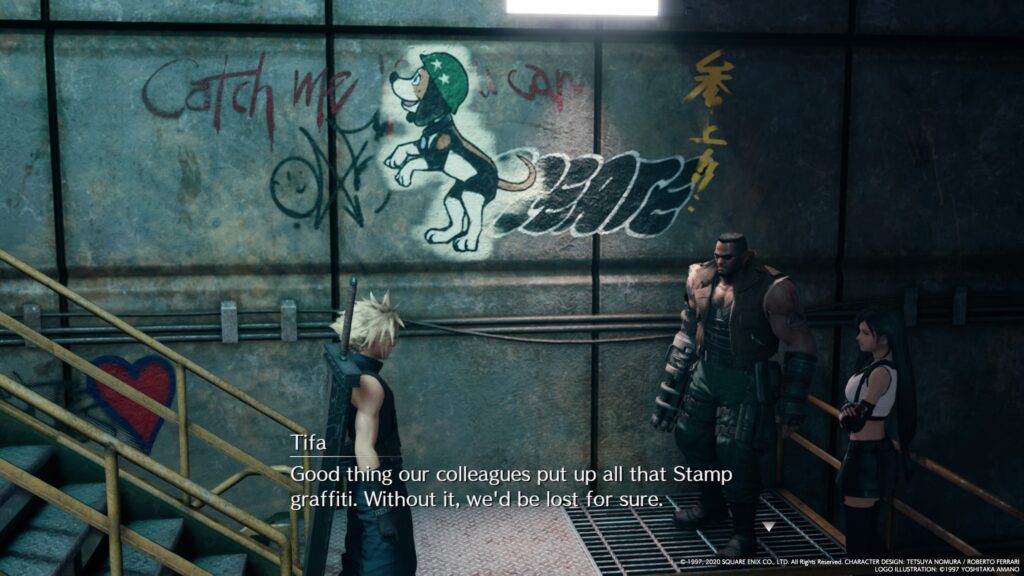
For all its faults, Final Fantasy VII Remake is still a good video game. The production values are through the roof, and it is clear that Square Enix spared no expense when it came to the unbelievable amount of assets to decorate the environments. Even the combat system somehow manages to walk the fine line of being strategic, and demanding some skill from the player.
Encounters look incredible, as all kinds of flashy Unreal 4 fireworks paint the screen with all kinds of effects. Enemies are varied and plentiful; with lots of familiar foes from the original, and some new threats that feel like they have always belonged.
The artistic fidelity on display is for the most part, on par with CGI cutscenes. The only times where it looks like Square Enix handed off work to some executive’s daughter who just learned how to model is in the hub-like town areas. There you’ll find some really poor quality textures, and sloppy modeling that look like something out of an N64 game.
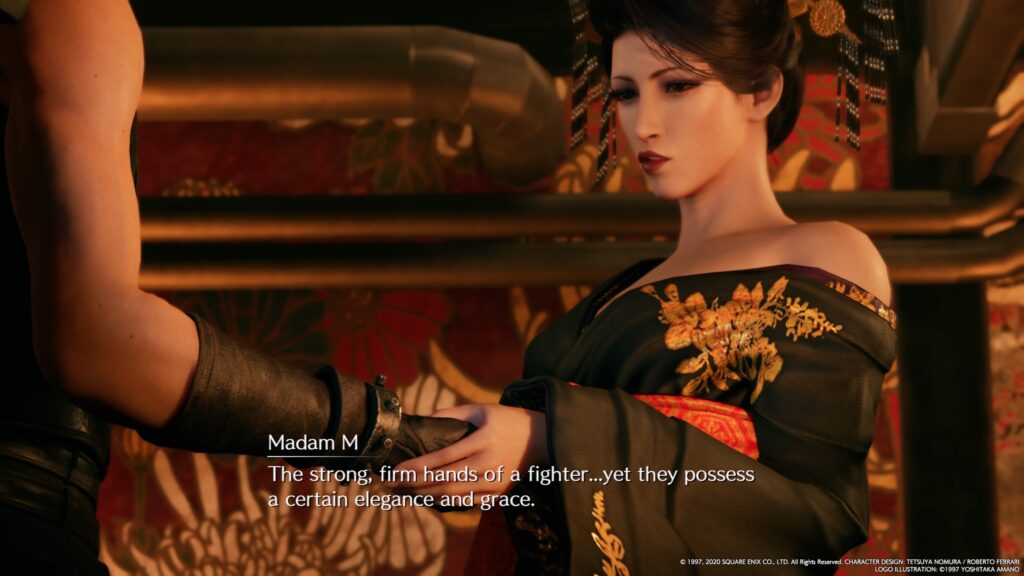
Final Fantasy VII (1997) had incredible world building. People in different towns and cities came from varying walks of life. There was a noticeable difference in dialogue and cadence from people who lived in the major cities, versus a military town, versus a blue collar settlement in the boondocks.
The reluctance and eventual acceptance of Mako was due to the world being a harsh setting you could see it through the people. It was a flawless depiction of industrialization. NPCs would believe Shinra lies, because things were not as one-sided as they are in the remake. Most grunts were just following orders like Cloud once did. Even the Turks were depicted in the same way.
The idea that the Mako was actually the planet’s lifestream was something that was not as concrete in the original. The remake flat openly embraces this, and it is seemingly common knowledge that everyone accepts that they are siphoning the planet’s blood. Everyone thought Mako was some natural occurring energy source, the idea of it being something more than that was novel.
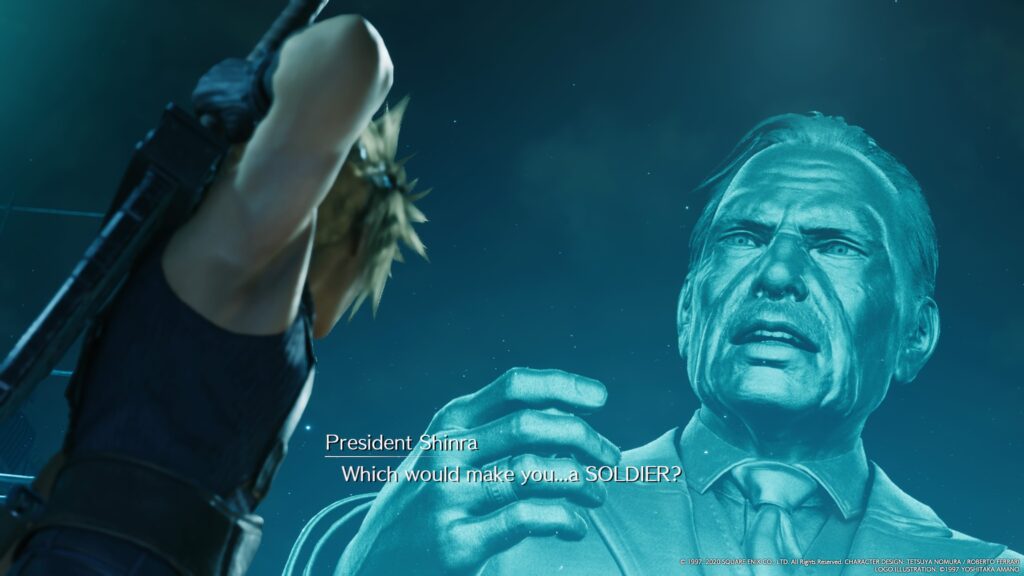
Final Fantasy VII Remake does make up for its incongruity with the Mako concept by fleshing out other aspects of the world building. The amount of original graphic design for various products and establishments in Midgar are seemingly endless. The art team even went the extra mile to design original album art for every piece of music you can find.
The attention to detail is so dense and surprising with how far the art team went, that it truly does feel like everyone who worked on this was extremely proud and wanted to their best. There are seemingly endless amounts of NPCs that have these specific animations that add life to the scenery, and thousands of lines of spoken dialogue that can be clearly heard as you walk through dense crowds.
It manages to be almost overwhelming to try to see and hear it all. The ambiance is very palpable, and is very faithful to the original. The filthy and trash filled industrial wasteland is a setting that has rarely been done, and Final Fantasy VII Remake is likely going to be the definitive depiction of this kind of dystopian world for a very long time.
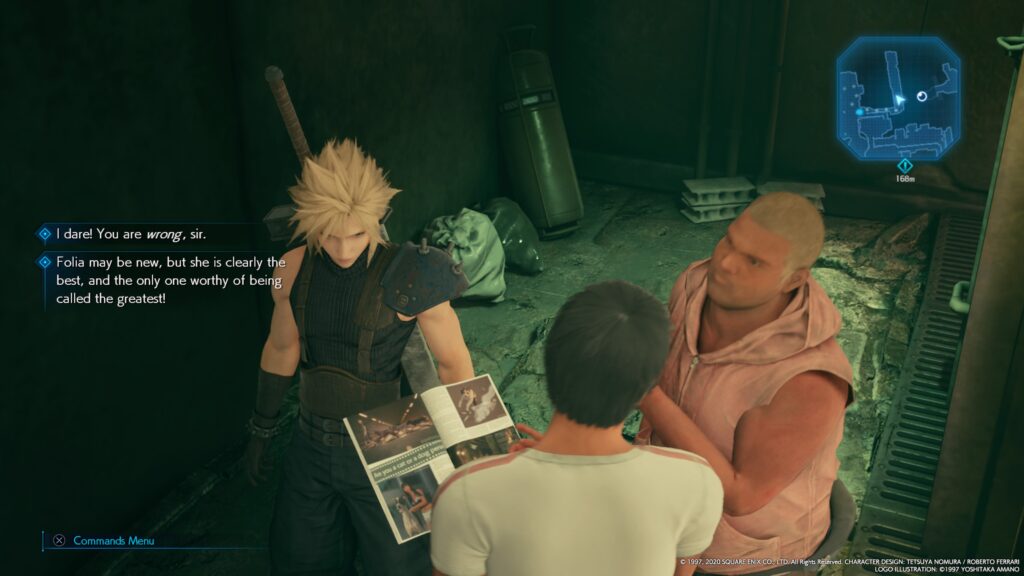
The boss battles are the highlight of the game. These battles are always unique from anything else you encounter in the game, and every aspect of the combat system demands the player to fully understand its nuances.
Final Fantasy VII Remake is not a turn-based RPG, it is an action game that relies on a team dynamic, with the player managing actions as they cause scratch damage with basic attacks. The most important aspect to any character is not even their stats; it is the Materia they bring with them into battle, and knowing how to build up as much ATB as possible.
It is a very unique combat system that plays nothing like the original, but it is still very compelling and does offer some room for high level play. The only disappointing part of fighting is the summons, which can only be used for very specific moments, and are not really worth using that much.
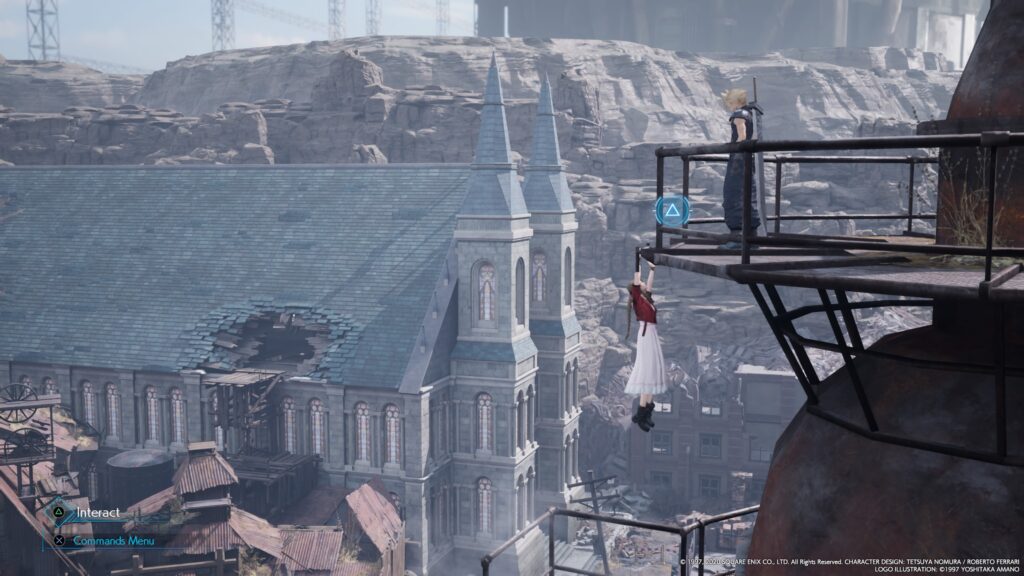
When not viciously whacking rogue sweepers with steel surf boards, the exploration and navigation of Midgar will prove to be very linear. This is not the huge open world city that some people assumed it might be.
Sometimes, Final Fantasy VII Remake can feel like a walking sim when it features extended set-pieces of just scenery to take in. Cloud is not able to interact with much during these moments, and the idea is to add lots of flavor and environmental story telling.
Other times, the game seemingly takes from the Yakuza playbook. Cloud will find himself in several hub areas, with several side stories and mini-games to partake in. These are usually book-ended between the extravagant main story set-pieces, and do a decent job at breaking up the constant barrage of fighting.
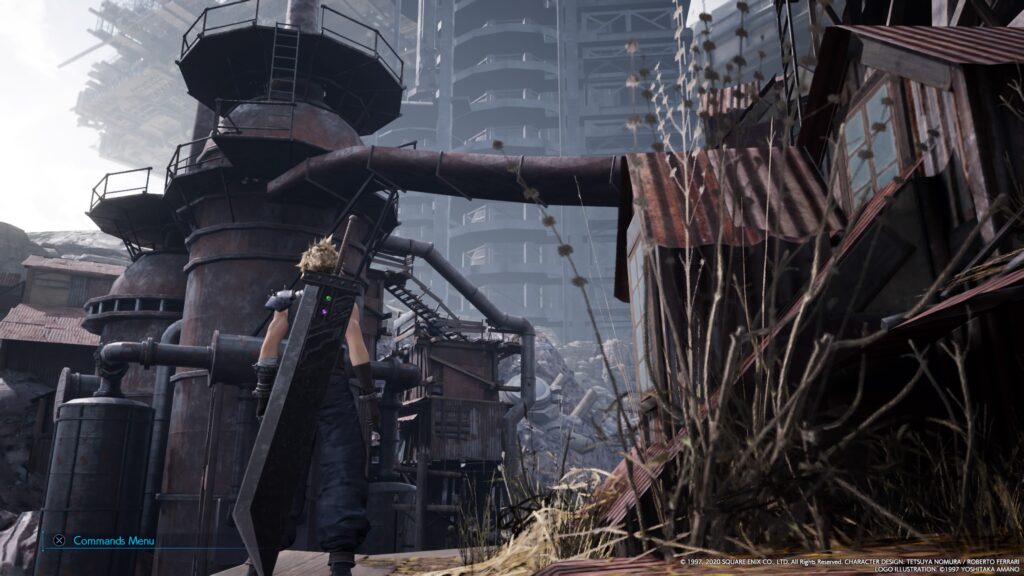
If there was one thing Final Fantasy VII Remake does manage to surpass the original in, it is its soundtrack. Final Fantasy VII (1997) is known for having one of the best compositions by the master Nobuo Uematsu, and Square Enix made the right call by having the man himself return to re-interpret his compositions for the remake.
The soundtrack and how it’s used in the game is sublime. There multiple variations of each track, and they are layered so that they can seamlessly transition into one another as scenes change. Whether you’re getting into a fight, or moving around to a different part of town, everything has its own sound and flavor to it.
The music and the themes truly enhance the game, and make it come alive in ways so few video games can. Some of the new original songs created are also electrifying, and fit so naturally in the world.
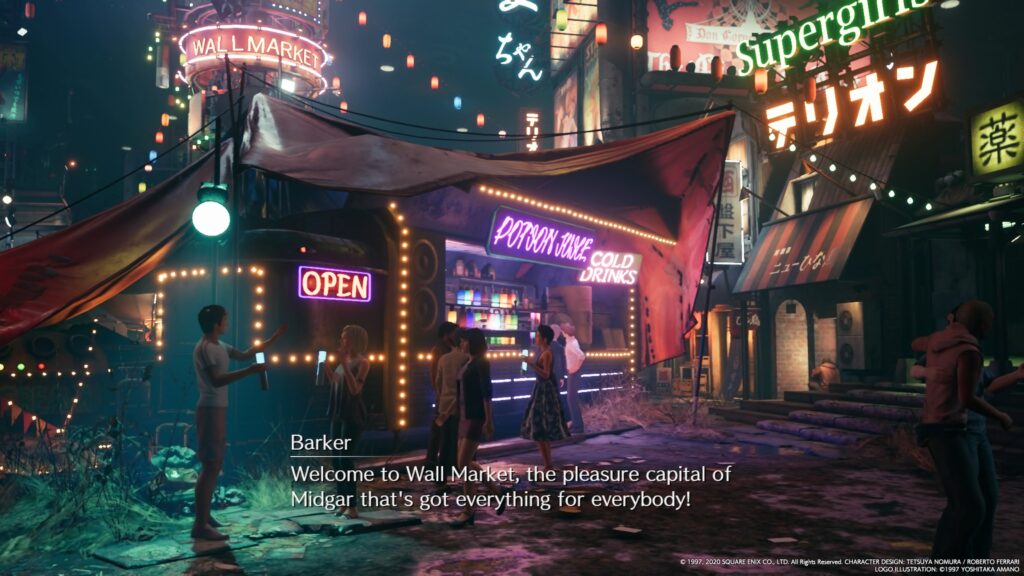
The soundtrack truly elevates the game, even when it’s at its low points. Compounded with the rich visuals, and distant NPC chatter, there are few games that manage to have such a tangible ambiance like this.
Final Fantasy VII Remake may frustrate long time fans of the original game. At times it can be easy to forget some of the concessions and miscalculations that had to be made, because the effort put into it is unprecedented. The game has very high highs, and some embarrassingly low, lows.
Despite the inferior creative decisions made, Final Fantasy VII Remake worth your time playing. Whether you are a fan of the original, or never played it, there is still a lot to enjoy- and it ranks as one of the better Final Fantasy games made to date. Not since Final Fantasy X, has there been one this good.
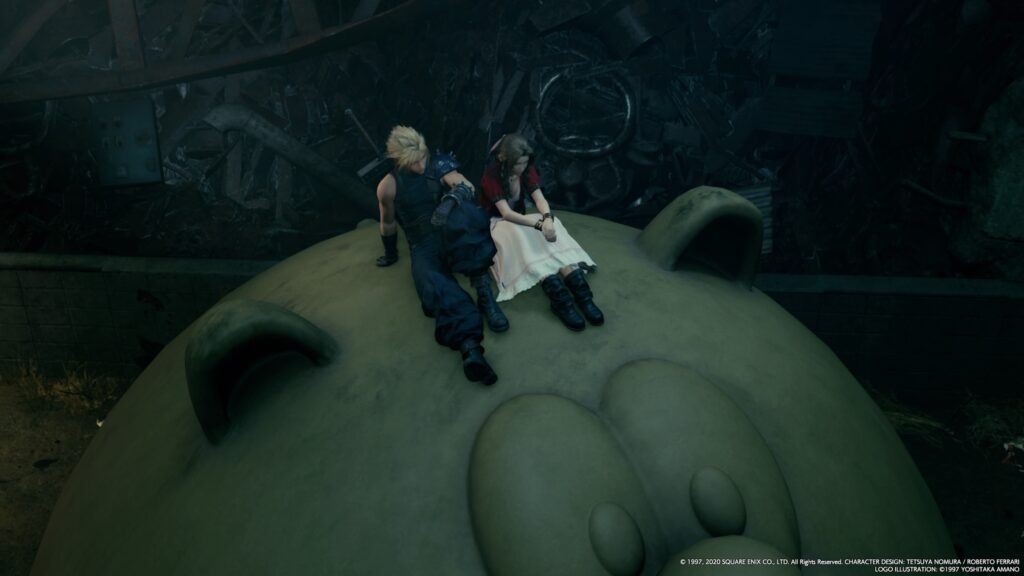
Final Fantasy VII Remake does not replace the original. It also leans on the original for various means, whether it is for meta-narrative purposes, or its own existence. It is inefficient with its time, leading to a bloated and padded-out scenario that was told so much more effectively in 1997.
It does enhance some characters who had very little screen time, and the cast do an admirable job at bringing them to life. The soundtrack and combat system are the most polished that the franchise has ever had. So much of the setting and atmosphere is so well defined that it almost feels real.
It is a shame that so much time had to be wasted in Midgar, and that Final Fantasy VII Remake couldn’t be just a remake. There was room to improve upon for the original, but that is not what Tetsuya Nomura wanted to do. He was more interested in leaving his stain on what is Square Enix’s most important game ever they made.
Final Fantasy VII Remake was reviewed on PlayStation 4 using a review copy provided by Square Enix. You can find additional information about Niche Gamer’s review/ethics policy here.